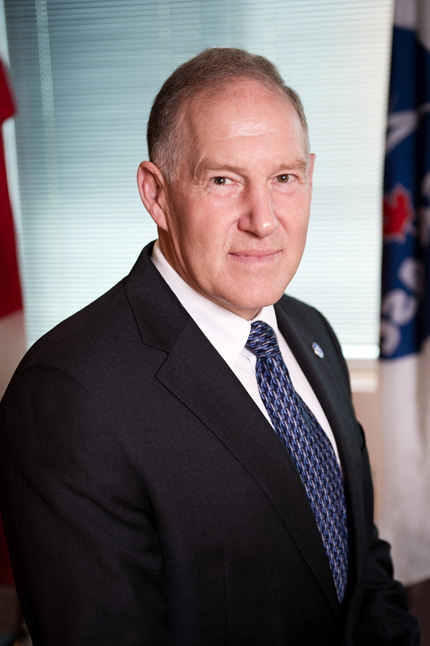OTTAWA, CANADA – With a booming voice, Walt Natynczyk — in his first speech after becoming Canadian Space Agency president in September — told delegates that he was happy to give up the “dream of retirement” to take on a challenging position.
“Imagine this picture. February. Saturday morning. 7 in the morning. It’s -25 [Celsius, -13 Fahrenheit] and I’m out there, by my lonesome, walking three dogs. None of which are mine. But their owners, who are family members, who I love, are all headed down south,” Natynczyk said.
“As I’m stooping over to pick up another pile of doggie doo, a neighbor — that I love — sticks her head out the door and says, ‘Hello, how the almighty have fallen.’ ” He paused as the room roared with laughter. “Think about it. That’s when I thought it was time to do something different.”
Natynczyk is best known in Canada for leading a large restructuring of the country’s military. He also was (as an exchange officer) a deputy commanding general in the United States, among other positions, and served in Baghdad at the height of the Iraqi war in 2004. His appointment to the CSA had some worried about the militarization of the agency. Natynczyk, however, focused on how difficult the new vocabulary is to master.
Speaking of a recent conversation with quantum researchers — the field that his predecessor, Steve MacLean, went into after leaving the CSA this year — Natynczyk said to them, “The point at which you start losing me is like talking to my puppy; when I start doing this,” — he tilted his head to one side — “you’re losing me.”
Joking that nanosatellites and microsatellites are equivalent to “milk cartons” and “milk jugs”, Natynczyk said one of his main goals is to make space understandable to the typical Canadian standing in line at Tim Horton’s, a coffee chain that is prolific in the country.
His comments on space policy were few. Last year, the Canadian government asked an external group to do a space development strategy for the country, and little has been mentioned publicly since the strategy was released. Natynczyk said conversations are ongoing with other government departments to address the recommendations.
Throughout, he stressed the importance of Canada’s choice to pursue research and development through the universities (with government support) rather than through government directly.
“It’s what we do with CSA, with the universities and so on, looking for extraordinary concepts that are in a higher-risk category and investing in a modest way — perhaps with other government funding … that allow for exponential jumps.”

